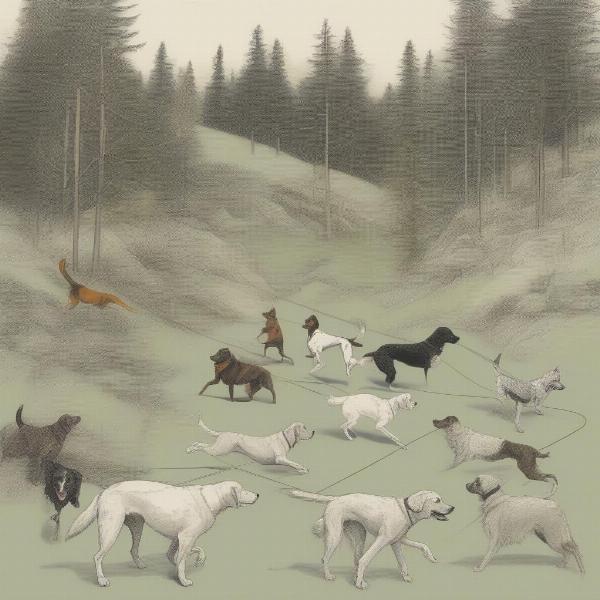Good tracking dogs possess an innate ability coupled with specialized training, making them invaluable partners in various fields. Whether it’s search and rescue, law enforcement, or simply finding a lost pet, these remarkable canines utilize their powerful sense of smell to follow scents over long distances and challenging terrains. Choosing the right tracking dog, understanding their training requirements, and ensuring their proper care are all crucial aspects of successful tracking.
![]() Good Tracking Dogs in Action
Good Tracking Dogs in Action
Key Qualities of Good Tracking Dogs
What makes a dog a good tracker? Several key traits contribute to a dog’s tracking prowess. A strong sense of smell is paramount, allowing them to discern even faint odors. Focus and determination are essential for maintaining concentration on the trail, even with distractions. Physical stamina is crucial for enduring long searches, especially in demanding environments. Finally, trainability is key for developing and refining their natural tracking instincts.
Top Breeds for Tracking
While many breeds can be trained to track, some are naturally predisposed to excel in this area. Bloodhounds, with their exceptional olfactory capabilities, are renowned trackers. German Shepherds, known for their intelligence and trainability, are also highly effective. Other breeds like Beagles, Basset Hounds, and Coonhounds also possess strong scenting abilities and make excellent tracking dogs. good deer tracking dogs are particularly skilled in this area.
Training Your Tracking Dog
Effective tracking requires specialized training. Early socialization and exposure to various scents and environments are crucial for developing a well-rounded tracking dog. Consistent, positive reinforcement training methods are most effective, focusing on rewarding desired behaviors. Start with simple tracking exercises and gradually increase the complexity and length of the trails. german shepherd stud dogs are often selected for their tracking abilities and bred for these qualities.
Scent Discrimination Training
Scent discrimination is a crucial aspect of tracking. This training involves teaching the dog to differentiate between target scents and other odors. Start by introducing the dog to the specific scent you want them to track, gradually adding distractions and increasing the difficulty.
Caring for Your Tracking Dog
Proper care is essential for maintaining your tracking dog’s health and well-being. A balanced diet, regular exercise, and routine veterinary check-ups are crucial. Protecting their paws from harsh terrains and extreme temperatures is also important. Finally, providing mental stimulation through tracking exercises and other activities helps keep them engaged and fulfilled. hunting dogs for adoption may already have some basic tracking skills.
Conclusion
Good tracking dogs are invaluable assets in various situations, requiring a combination of natural ability, specialized training, and dedicated care. By understanding the key qualities of a good tracker, choosing the right breed, and employing effective training methods, you can develop a successful partnership with your tracking dog. Remember that patience, consistency, and positive reinforcement are key to unlocking their full tracking potential. For those interested in smaller breeds, there are excellent small breed hunting dogs that can be trained for tracking.
FAQs
- What age should I start training my dog to track? You can begin introducing basic scent work as early as puppyhood, but formal tracking training typically begins around 6-12 months of age.
- How long does it take to train a tracking dog? The training timeline varies depending on the dog’s aptitude, the complexity of the task, and the consistency of training. It can take several months to years to develop a proficient tracking dog.
- What equipment do I need for tracking training? Essential equipment includes a tracking harness, a long line, scent articles, and rewards.
- Can any dog be trained to track? While most dogs possess a sense of smell, not all dogs are suited for intensive tracking work. Breeds with a strong scenting ability and the necessary drive are more likely to excel.
- Where can I find a qualified tracking dog trainer? Search for certified dog trainers specializing in scent work and tracking in your area.
Expert Insight:
- “A good tracking dog is a blend of natural talent and dedicated training. Patience and consistency are key to their success.” – Dr. Emily Carter, Canine Behaviorist
- “The bond between a handler and their tracking dog is built on trust and mutual respect. This partnership is crucial for effective teamwork.” – John Davis, Professional K9 Trainer
- “Investing in high-quality best door mats for dogs can help keep your home clean from the dirt and debris your tracking dog inevitably brings in.” – Sarah Miller, Experienced Dog Owner
ILM Dog is your trusted global resource for all things dog-related. We offer expert advice on dog breeds, health, training, nutrition, grooming, and much more. Whether you’re a seasoned dog owner or just starting your journey, ILM Dog provides the information you need to care for your canine companion. Contact us today for personalized support: Email: [email protected], Phone: +44 20-3965-8624. Visit ILM Dog for more valuable resources.
